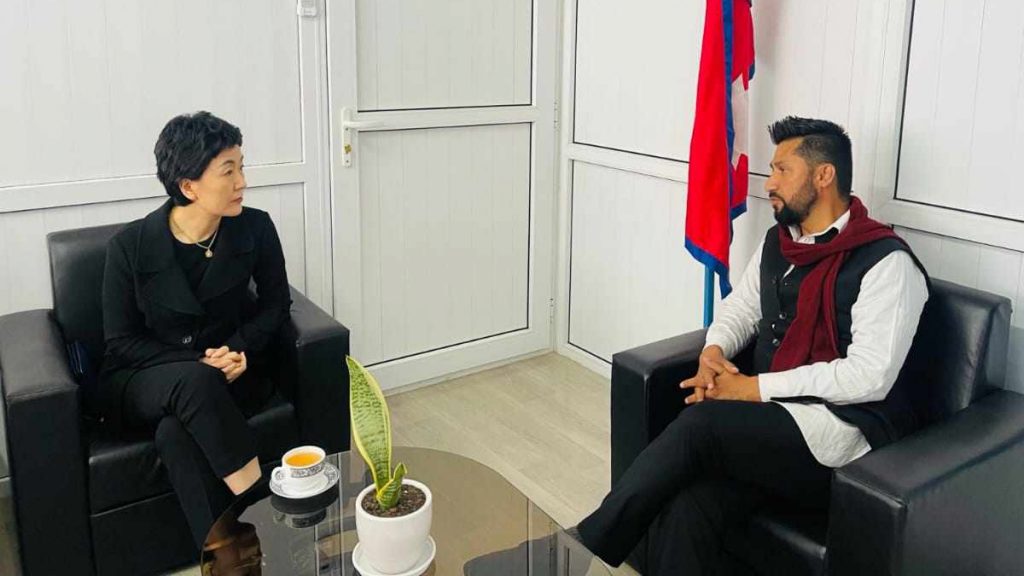Rabi Lamichhane’s China Connection: Rising Influence Sparks Growing Dissent and Political Trouble

Rabi Lamichhane, the enigmatic leader of Nepal's Rastriya Swatantra Party (RSP), has always been a figure of national fascination, praised for his bold stance against corruption and his self-styled image as a political reformer. However, beneath the surface of his populist appeal, growing ties with China have triggered alarm among international democratic forces, raising questions about his political future and the underlying motives of his leadership. Recent events have only deepened the unease, with suspicions that Lamichhane’s connection with China may have helped fuel the political crises he now finds himself embroiled in.
Vice Minister Sun Haiyan’s Visit: A Nod from Beijing
The year 2024 began with a significant diplomatic gesture from China when a high-level delegation from the International Liaison Department of the Communist Party of China (CPC) visited Nepal in January. The delegation was led by Vice Minister Sun Haiyan, a key figure in China’s foreign political engagement. During the visit, Sun Haiyan met with Rabi Lamichhane, acknowledging the RSP’s rapid rise in Nepal’s political landscape and extending Beijing’s best wishes for his party's continued success.
For many, this meeting between a rising star in Nepali politics and a key figure in China’s Communist Party marked a formal recognition of the RSP by China. This acknowledgment, particularly from the Chinese, signaled that Lamichhane’s party had secured favor from Beijing, a fact that was noted with concern by other international democratic actors who had thus far remained distant. While China’s recognition of the RSP and its leader was seen by some as a diplomatic success for Lamichhane, it also set off alarm bells within international circles, particularly among India and the West.
The RSP Delegation to China: Strengthening Party-to-Party Ties
Fast forward to mid-September 2024, and the Rastriya Swatantra Party was once again in the spotlight, this time for sending a formal delegation to China. Led by RSP Vice President Dr. Swarnim Wagle, the delegation of 14 members, which included seven members of parliament and seven other party leaders, was invited by the Chinese Communist Party (CCP) to further solidify the inter-party relationship between the two sides.
The delegation included prominent figures such as Dr. Wagle, Shishir Khanal (Head of International Relations), Lima Adhikari (Treasurer), and Manish Jha (Acting Spokesperson), among others. Their visit, initially planned for 10 days, was cut short due to escalating political developments back home. This abrupt return, just two days into the trip, has led many to speculate whether Lamichhane, sensing the growing discomfort of international democratic forces with his China connection, ordered the delegation back to avoid further controversy.
Lamichhane’s party has maintained that the visit to China was part of a broader effort to understand global political dynamics and foster inter-party relations. However, for many observers, the optics of this visit, particularly against the backdrop of growing Chinese influence in South Asia, are troubling. The fact that no similar invitations have been extended to the RSP by India or the United States only deepens suspicions about where Lamichhane’s allegiances may lie.
Rabi Lamichhane’s Ties with the Communist Government: A Shifting Political Identity
While Lamichhane’s Rastriya Swatantra Party initially rose to prominence as an anti-establishment force promising to root out corruption and political malpractice, its leader’s actions over the past year suggest a more complex political alignment. Lamichhane, known for his fiery rhetoric against corrupt political elites, surprised many when he joined the communist-led government on two separate occasions. Both times, he served as Deputy Prime Minister and Home Minister, positions that placed him at the heart of Nepal’s power structure, much to the disappointment of those who had hoped his party would remain independent of traditional political blocs.
Lamichhane’s decision to align himself with the communist government, particularly with a government known for its pro-China stance, drew criticism from international democratic actors who had hoped that the RSP would represent a third alternative in Nepal’s geopolitically sensitive landscape. Instead, Lamichhane’s growing ties to China, as evidenced by his party’s close interaction with the Chinese Communist Party and his involvement in a pro-China government, have led to concerns that he may be steering Nepal closer to Beijing at the expense of its historical ties with India and the West.
Dissatisfaction among International Democratic Forces: A Growing Rift
The growing closeness between the RSP and China has not gone unnoticed by international observers. Both India and the United States have long viewed Nepal as a strategic buffer state in South Asia, and any tilt toward China is seen as a potential threat to regional stability. The fact that no Indian or Western political parties have extended formal invitations to Lamichhane or his party is a sign of the unease surrounding his political trajectory.
For India and the West, Lamichhane’s willingness to engage with China, while remaining silent on key issues such as human rights and democratic governance, has created a rift. Moreover, his recent alignment with a communist government, despite his party’s founding principles, has only fueled concerns that he may be willing to compromise democratic ideals for political expediency.
It is against this backdrop of growing international dissatisfaction that recent developments in Nepal take on a new dimension. Lamichhane’s decision to recall his party’s delegation from China just days into their visit suggests that he is acutely aware of the dangers his China connection may pose to his domestic and international standing. Whether this move will be enough to placate his critics remains to be seen, but it is clear that Lamichhane’s political future is now inextricably linked to how he navigates his relationship with China.
Legal Troubles and Public Backlash: Lamichhane’s Mounting Challenges
As if his growing China ties were not enough, Lamichhane is now facing a series of legal and political challenges that threaten to derail his political career. The most recent development came when his close associate, Chhabilal Joshi, was arrested on charges of embezzling cooperative funds. Joshi’s arrest has sent shockwaves through the RSP, as he is not only a close confidant of Lamichhane but also a key figure in the party’s financial apparatus.
In response to Joshi’s arrest, Lamichhane took to Facebook to issue an urgent post, challenging Prime Minister KP Sharma Oli to return to Nepal for discussions. In his post, Lamichhane accused the government of orchestrating a political conspiracy to undermine his party and vowed to fight back. The post quickly went viral, creating a nationwide stir and deepening the sense of crisis surrounding the RSP.
This latest scandal is not the first time Lamichhane has found himself in legal trouble. He has previously been implicated in the death of journalist Salikram Pudasaini, a case that garnered widespread media attention. Additionally, allegations of financial mismanagement during his time as a media personality have continued to haunt him. Now, with accusations of his involvement in the embezzlement of cooperative funds, Lamichhane’s image as an anti-corruption crusader is rapidly crumbling.
The End of the China Connection?
As Rabi Lamichhane faces mounting legal and political challenges at home, his relationship with China is coming under increasing scrutiny. His decision to recall the RSP delegation from China may signal an attempt to distance himself from Beijing and avoid further alienating international democratic forces. However, if Lamichhane continues to engage with China, he risks deepening the rift between his party and key democratic allies in the region.
With his party’s internal structure under strain, his legal troubles mounting, and international skepticism growing, Lamichhane’s political future is far from certain. His connection with China, once seen as a potential asset, now appears to be a liability, and his next moves will be critical in determining whether he can weather the storm or if he will become yet another casualty of Nepal’s turbulent political landscape.
Conclusion: A Political Reckoning on the Horizon?
Rabi Lamichhane’s rise to power has been nothing short of meteoric, but his growing ties with China and the legal challenges he now faces suggest that his political trajectory may be on the verge of a dramatic reversal. Whether he can successfully distance himself from Beijing and rebuild trust with international democratic forces remains to be seen. One thing is clear, however: Lamichhane’s connection to China has become a central issue in Nepali politics, and how he navigates this relationship will determine not only his political future but also the direction of Nepal’s foreign policy in the years to come.




![From Kathmandu to the World: How Excel Students Are Winning Big [Admission Open]](https://nepalaaja.com/img/70194/medium/excel-college-info-eng-nep-2342.jpg)
